
Discovering your menstruation as a spiritual practice
Yasmine understands her menstruation as a spiritual practice and shares in this interview how she is connecting more with her own body through cycle awareness.
The German documentary “nicht die Regel – Ein Dokumentarfilm über Endometriose” aims to show that endometriosis is not the norm. It aims to make the disease visible to the public and to combat false myths about it. To make it clear how many people are affected by endometriosis, the documentary is produced exclusively by endometriosis patients. The entire team consists of cis-women who are themselves affected by the disease. In this interview, initiator Ranya Schauenstein gives us an insight into the making of the documentary and what the future holds for the film about endometriosis. Many, many thanks for your important educational work!
Yes, of course. On the team are: Ranya Schauenstein, I am the founder of the project. Dina Tasic is the art director, Tabea Hablützel is our camerawoman, Dora Wojna is the project manager, Miriam Reichel is the editor, Vanessa Dworschak is the content creator and Saskia Höfer takes care of press inquiries and sponsoring. Last but not least: off-speaker is Carina Frei.
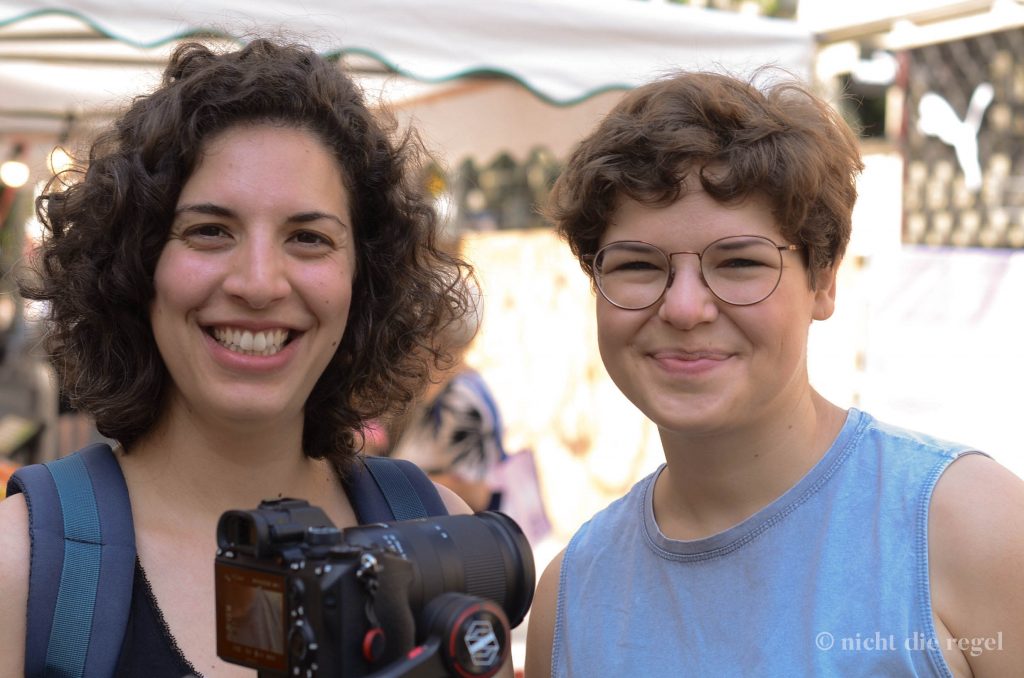
As I got I did a lot of research, but simply couldn’t find a full-length documentary about endometriosis in German. I had wanted to make a documentary for a while and then decided to make a film about endometriosis. Together with my friend Dina, our art director, we looked on Facebook for other women with endometriosis and very quickly put together a team of seven women. In June Saskia joined as the eighth member. All my colleagues have endometriosis, just like me. That connects us, even though each of us has made her own experiences. We have a common desire to make a difference and educate more people about this disease. That brings us together.
The idea for the film about endometriosis came in 2019. I started a open call and used Facebook to look for women who have endometriosis and work in the film industry. The goal was to make a statement: It affects so many women that a team of people affected can be put together quickly. We then looked for affected women who were willing to talk about their experiences in front of the camera. I was completely touched by each individual story. Whenever a woman confided in me and openly told me about the pain she had to deal with due to endometriosis during her period or in general, it strengthened my determination to make this film.
The documentary is not only intended to create awareness, but also to combat myths surrounding endometriosis. That is why we have sought the support of leading endometriosis experts and have tried to provide a very comprehensive, interdisciplinary insight. This disease affects us women not only during our periods, but also when we go to work, in our free time and in our private lives – in intimate moments and when we think about family planning. This is why not only gynecologists, but also a psychologist, a physiotherapist, a former politician, as well as doctors from the fertility center and others are talking about it. The film is now in post-production. We want to finish producing the documentary with our current crowdfunding campaign and bring it to the big screen.
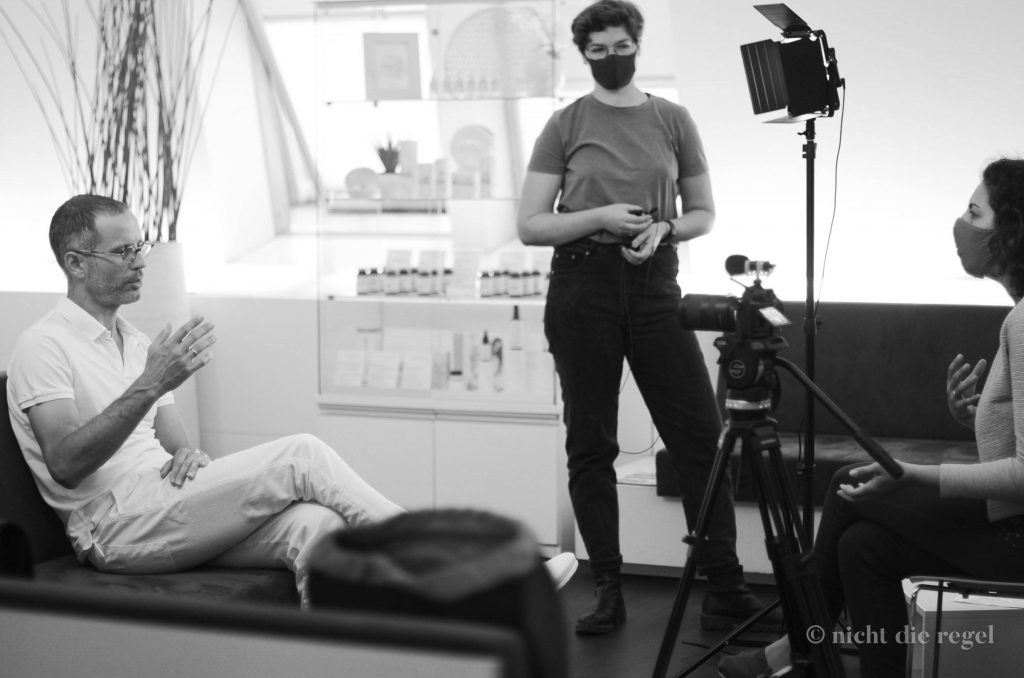
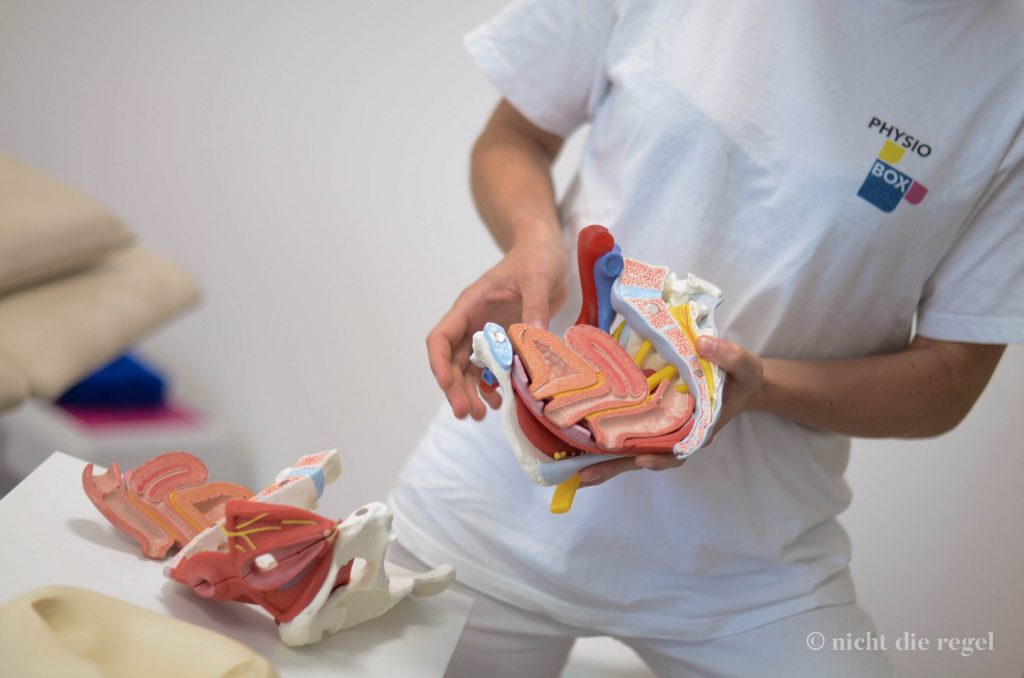
Photo Credits: Nicht die Regel
We are eight women and all affected, so we are very committed to the project. Because we do it voluntarily alongside our jobs, the filming took a while. We also shot during Corona, and that didn’t stop us either. The film is now finished and we are in the post-production phase. When eight women have endometriosis, it’s obvious that it takes patience. For example, on some days a team member spontaneously dropped out because of endometriosis. On long days of shooting we tried to select meals according to the dietary recommendations for endometriosis. In addition, we all showed great understanding if someone had to leave the set early or did not feel well for a moment – this is part of the job for a team of people who are all affected.
We often exchanged ideas and gave each other tips during shooting breaks or zoom meetings. The interviews with the experts and protagonists were very exciting and enriching for everyone, because we found ourselves in many stories. That was therefore very inspiring. We are not only a film team, but by now also friends and a kind of self-help group that encourages each other. The “work” has grown close to our hearts. So yes, it needs patience. But it is worth it. It was also an incredibly empowering time and we finished a film in about 1.5 years, shot it and then took it through post-production – including two lockdowns. I am proud of our team!
Wow, that’s hard to answer, because there are quite a few moments.
– Our first meeting as a team in the Caféhaus – long before Corona
– When the CI by Dina was determined final
– Our first interview with one of the three protagonists
– The confirmation of certain experts such as Jörg Keckstein
– A particularly emotional moment during the interview with Anna Wilken
– Go live of our website www.nicht-die-regel.at and Social Media pages– The start of our Crowdfunding
– DariaDaria shares our project and our following skyrockets
I have such a big dream, but even if only a little bit of it comes true, I would love it. If our film could help to ensure that at some point a woman or girl no longer has to ask herself: “What is endometriosis?, that would be great.
It would be ingenious if we could contribute to shortening the long diagnostic paths by making society aware of the existence of the disease. It would be great if the documentary could help to minimize the dreaded stigma. Women who fear for their jobs or career opportunities because they could be considered “not resilient” because of endometriosis. It would be nice if the film about endometriosis became an essential part of education. And for me, that is irrelevant for the time being, whether it is in schools, for future managers, in medicine or alternative treatment methods. Every woman should be informed, because only in this way can we make a reflected decision for our bodies.
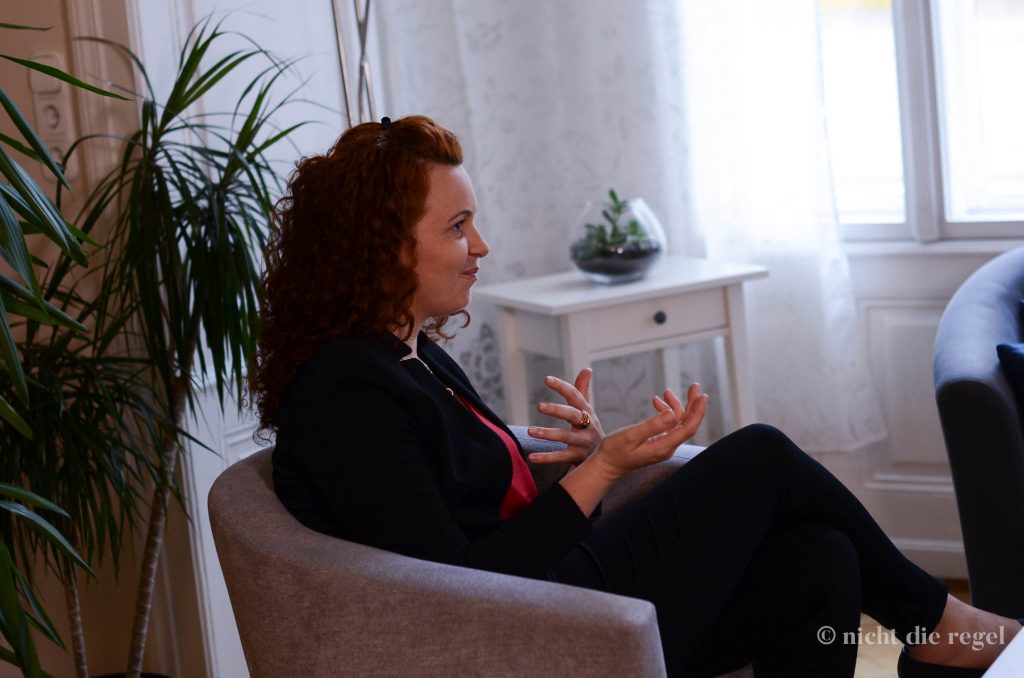
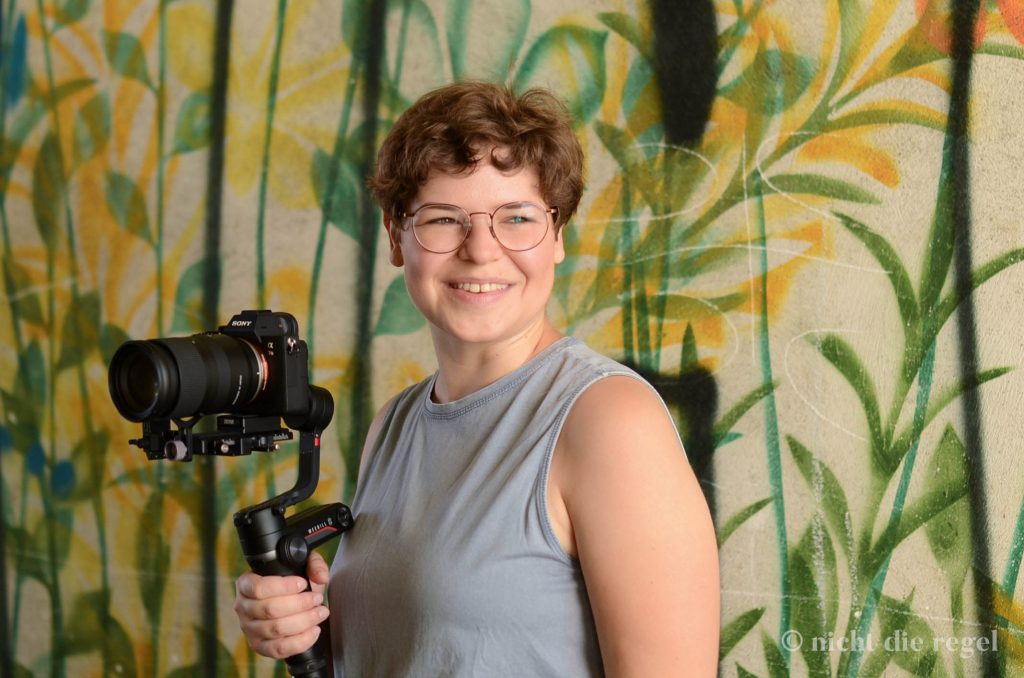
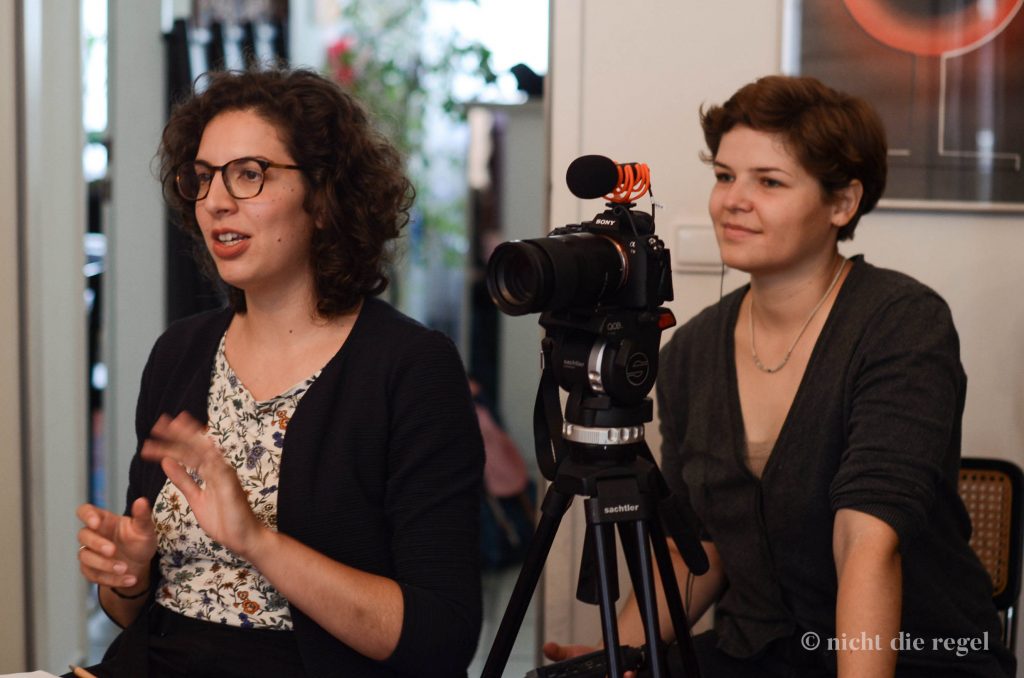
Photo Credits: Nicht die Regel
Mostly good. Many women are enthusiastic about our project and I notice that the reactions are sometimes split. Not in “for” and “against”, but rather in “Oh great, this is really important” and “Endometriosis, what is it?” And that is exactly our motivation in a nutshell.
When women do not know what endometriosis is and then learn about it, something extraordinary happens. Many people wonder why there is still too little information about endometriosis when so many are affected. How is it that in 2020 we still do not know where the disease comes from? This lack of understanding is precisely what drives us. There is something encouraging about it, because it makes us feel that what we are doing is right.
Successfully completing our crowdfunding campaign. We are currently at about half of our funding target. We want to collect 19,000 Euro by December 8, 2020. If we don’t achieve our funding target, we won’t get the money we’ve collected until then. So it is all or nothing for us. I am convinced that we will succeed. And we are committed to it!
Many women accept extreme pain as normal because this disease is unknown and can be very asymptomatic. The media response to this is now increasing, e.g. with magazine articles, articles and podcast episodes or contributions on radio and television. But there is no feature-length documentary film.
There are many aspects that can be discussed in relation to endometriosis. How differently the disease can occur and progress. The state of medical research. How women make the really courageous decision to have an operation – sometimes even several times – or ultimately to have their uterus removed. Involuntary childlessness. The question: How far do I go for my desire to have children? Myths about the disease, for example “endometriosis automatically means infertility”, “endometriosis is curable” etc. Questions about “having to bear pain” and public debates about periods and the breaking of taboos. Education of medical professionals. How should the labor market react to women with endometriosis? After all, the body “cycles” during office hours. What are the psychological effects of this chronic disease?
There are so many angles from which endometriosis can be looked at. And these are general questions. Every woman has a different route with the disease. It is really difficult to choose a first focus. But who knows, maybe there will be a continuation. *Wink*
INFO-BOX: The crowdfunding campaign will run on Startnext until December 8, 2020, in order to be able to pay for previous initial production costs and to secure financing of the professional post-production. We can all be helping in making endometriosis better known!
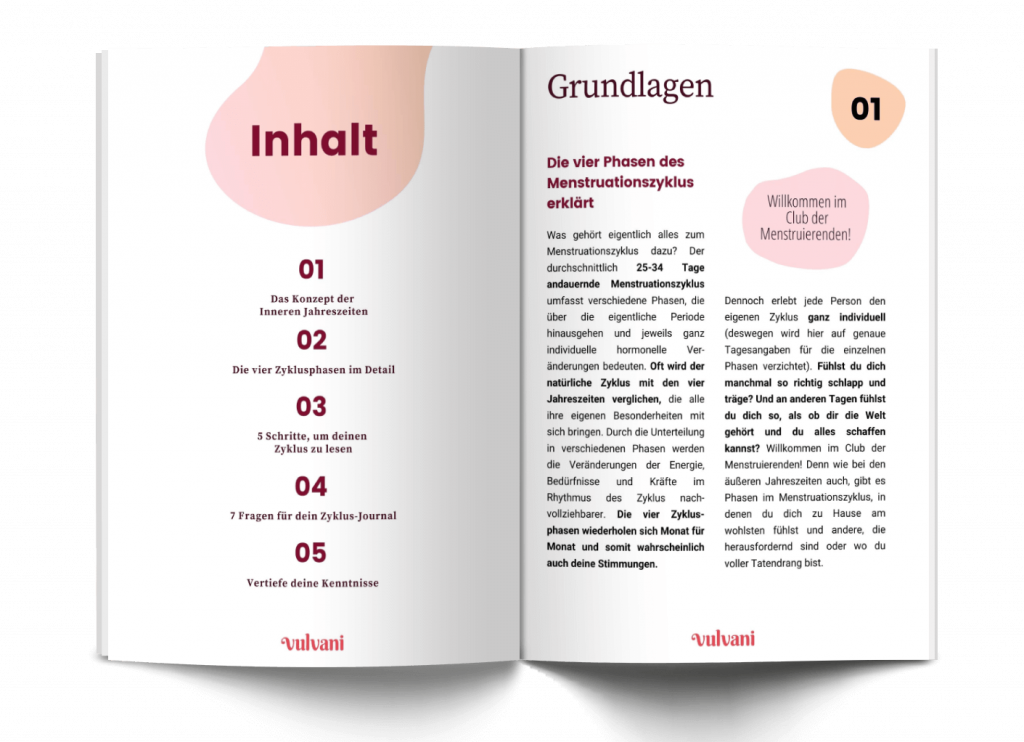


Yasmine understands her menstruation as a spiritual practice and shares in this interview how she is connecting more with her own body through cycle awareness.

What options are there for male birth control? Ailsa delivers an overview of what is available now, and what may come in the future.

Sustainable underwear? The founders of TUKEA talk about fair labour conditions, body diversity and body literacy.
…and empower countless women to make empowered choices about their bodies!

